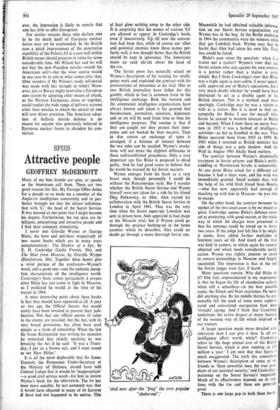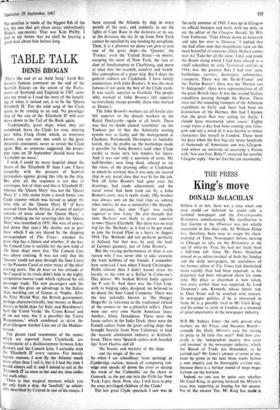Attractive people
SPIES GEOFFREY MeDERMOTT
Many of my best friends are spies, or spooks as the Americans call them. There are two good reasons for this. My Foreign Office duties for a decade or so made me a member of the Anglo-us intelligence community and in par- ticular brought me into the closest collabora- tion with `C,' the head of the Secret Service. It was mooted at one point that I might become his deputy. Furthermore, the top spies are in- telligent, enterprising and attractive people and I find their company stimulating.
I never met Greville Wynne or George Blake, the hero and anti-hero respectively of Iwo recent books which are in many ways complementary: The Shadow of a Spy, by E. H. Cookridge (Leslie Frewin, 30s), and The Man from Moscow, by Greville Wynne (Hutchinson, 30s). Together these books give a vivid picture of the confusion—Wynne's word, and a good one—and the endemic decep- tion characteristic of the intelligence world. Cookridge's book comes particularly a propos since Blake has just come to light in Moscow, as I predicted he would at the time of his escape in 1964.
A most interesting point about these books is that they should have appeared at all. A year or two ago the Official Secrets Act would surely have been invoked to prevent their pub- lication. Not that any official secrets of value to the enemy are revealed; but the Act, with its very broad provisions, has often been used simply as a form of censorship. When the late Sir Ivone Kirkpatrick was writing his memoirs he remarked that strictly speaking he was breaking the Act if he said : 'It was a Thurs- day, I put on a brown suit, and I went round to see Herr Hitler.'
It is all the more deplorable that Sir James Dunnett, the Permanent Under-Secretary at the Ministry of Defence, should have told Colonel Lohan that it would be 'inappropriate' —a good civil service word—for him to review Wynne's book for the sPEcrATon. The FO has been more sensible. Its tart comment was that it would have objected to many of its features if these had not happened to be untrue. This at least gives nothing away to the other side. It is surprising that the names of various `Cs' are allowed to appear in Cookridge's book, even if inaccurately. Up till now the conven- tion had been that, while of course our allies and potential enemies knew these names per- fectly well, it was thought better that the British should be kept in ignorance. The Americans make no such chi-chi about the head of the CIA.
The Soviet press has naturally seized on Wynne's description of his training for intelli- gence work and exploited the contrast with his protestations of innocence at his trial. One or .two British journalists have fallen for this gambit, which in fact is common form in the intelligence exchange. Both the western and the communist intelligence organisations have always known and taken it for granted that businessmen, journalists, scientists, diplomats and so on will be used from time to time for intelligence purposes. The routine is that if they are caught out they protest their inno- cence and are backed by their masters. Then in due course an exchange of spies is arranged, if a balance of interest between the two sides can be reached. Wynne's revela- tions will not make the slightest difference to these well-established procedures. Only a very important spy like Blake is prepared to plead guilty. And he had good cause to believe that he would be rescued by his Soviet masters.
Wynne emerges from his book. as a very brave man, though personally I could do without the Runyonesque style. But I wonder whether the British Secret Service and Wynne himself were not taken for a ride by his friend Oleg Penkovsky, or Alex. Alex started his collaboration with the British Secret Service in London in April 1961. That was the very time when the Soviet super-spy Lonsdale was sent to prison here. Alex appeared in bad shape at the Moscow trial; but if Wynne could go through the practice bashing-up in the home counties which he describes, Alex could no doubt go through a more thorough Soviet one. Meanwhile he had obtained valuable informa- tion on our Secret Service organisation; and Wynne was in the bag. At the Berlin exchange in 1964 the communists were the winners when they got Lonsdale back. Wynne says that he learnt that Alex had taken his own life. That too, could be faked.
Blake's case raises the question: when is a traitor not a traitor? Wynne's view that any Soviet citizen who acts against his own country is a patriot rather than a traitor is over- simple. But I think Cookridge's view that Blake was a triple agent is over-subtle. I never specifi• cally approved any of Blake's operations, but I very much doubt whether he would have been instructed to act as a double agent in the British interest. This is a method used most sparingly. Cookridge says he was a victim as well as a traitor. But it is hard to feel any sympathy for Blake. I saw for myself what havoc he caused to western interests in Berlin and beyond. When I went there on secret busi- ness in 1953 it was a hotbed of intelligence activities—as hot as Istanbul in the war. Then Blake operated there from 1955 to 1959. By 1961 when I returned as British minister that side of things was a pale shadow. And the Wall in August 1961 finally fixed matters.
The contrast between Wynne's abominable treatment in Soviet prisons and Blake's molly- coddling at Wormwood Scrubs is noteworthy. At one point Blake asked for a different cell because it had a nicer view, and his wish was immediately granted. Small wonder that, with the help of his wild Irish friend Sean Bourke who has now apparently had enough of shacking up with him in Moscow—he was able to escape.
On the other hand, the contrast between the upshot of the two court cases is by no means so great. Cookridge quotes Blake's defence coun- sel as protesting, with good reason, at the tricky way in which the charges were presented so that his sentence could be totted up to forty- twO years. If the judge had felt like it he might, it seems, have added further multiples of fourteen years ad lib. And much of the trial was held in camera, to which again his counsel objected and which needs considerable justifi- cation. Wynne was rightly anxious to avoid in camera proceedings in Moscow and largely succeeded. The impression is that in the end the Soviet judges were fair, if harsh, Many questions remain. Why did Blake do it? One fact, unprecedented in my experience, is that he began his life of clandestine activity when still a schoolboy—in the best possible cause, the Dutch anti-Nazi resistance. He never did anything else. By his middle thirties he pre- sumably felt the need of some more sophisti- cated and convoluted occupation than mere `straight' spyiQg. And I think that Cookridge underrates the active disgust at many features of the western way of life which inspired all our traitors.
A larger question needs more detailed con- sideration than I can give it here. Is all our intelligence effort worth while? Cookridge refers to 'the huge annual cost of the British Secret Service, which is now running at £50 million a year.' I am sure that that figure is much exaggerated. The truth lies somewhere between Wynne's description of some of my friends as 'these powerful men, the true guar- dians of our national security,' and Cookridge's insistence on the Secret Service's ineptitude. Much of its effectiveness depends on its rela- tions with the tilt and these are generally good. There is one large gap in both these books. No mention is made of the biggest fish of the lot, the one that got clean away; undoubtedly Blake's spy-master. That was Kim Philby. I feel in my bones that we shall be hearing a good deal about him before long.







































 Previous page
Previous page